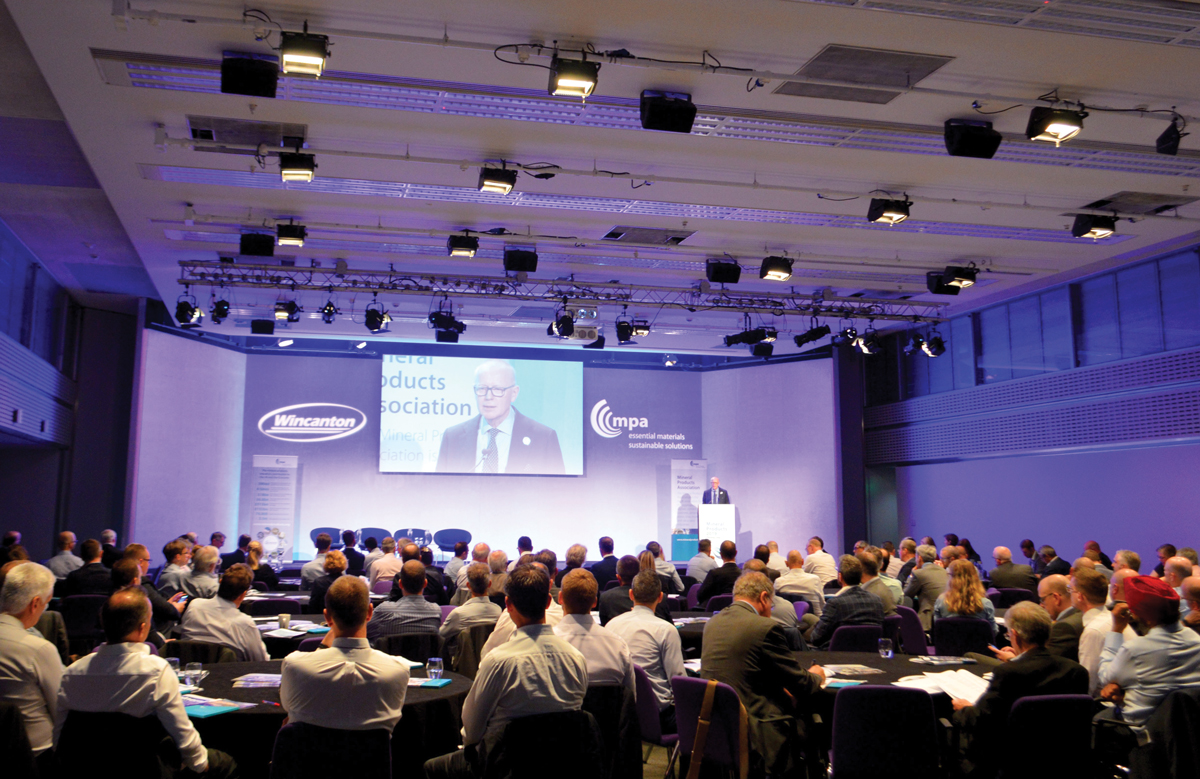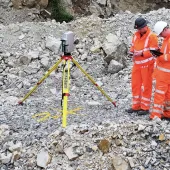MPA Annual Conference 2019

First published in the August 2019 issue of Quarry Management
Key industry conference addresses impacts of ‘change’ on the mineral products industry
The Mineral Products Association (MPA) members’ annual conference, ‘Mineral Products 2019 – Planning Long… Embracing Change’, took place on Monday 24 June at Queen Elizabeth II Conference Centre, Westminster. Celebrating 10 years since the Association was formed, the event, hosted by journalist and BBC newsreader Sophie Raworth, attracted a packed audience of high-level delegates, including many chief executive officers, from 90 different organizations spanning MPA member companies, NGOs, trade associations, consultants and government departments and agencies.
Painting a picture of the digital future and artificial intelligence, Lindsay Herbert, author of ‘Digital Transformation’, gave an insight into digital innovation. Using examples from organizations including Harvard, the UN Refugee Agency, Morgan Stanley and the RIJKS Museum, she highlighted that the ability to innovate requires collaboration to solve a problem, that innovation is learned by doing, and that each breakthrough builds on the previous one.
William Zimmern, head of global macroeconomics at BP, and Michael Grubb, Professor of Energy and Climate Change at University College London (UCL), provided an insight into the latest developments in the energy sector. They answered questions about the effect of climate change, the increasing demand for oil, competition in the global oil market, and sources of energy supply, including the contribution of renewable energy where solar power is expected to grow tenfold and wind power fivefold.
Professor Vernon Bogdanor, Research Professor at the Centre for British Politics and Government, King’s College London, gave delegates his views on what may be happening to the country’s broken party politics and democracy, commenting on the shift to more parties and what this means in a first-past-the-post system. On Brexit, he spoke about the clash between parliament and direct democracy, and the future implications of the UK’s unwritten constitution.
Keith Waller, programme director of the Transforming Construction Alliance and head of the Government’s Construction Innovation Hub, discussed the challenges and opportunities of delivering prefabricated and modular construction in concert with technology and digitization. He outlined the Government’s wish to see public sector buildings adopt modern methods of construction in order to address skills shortages, improve productivity and drive down waste while speeding up construction. He also stressed that there is a huge amount of diverse talent in engineering and that we need new thought and greater diversity of thinking, not just a reinforcing of the old ways of doing things.
Dr Matthew Free, director of geohazards and risk management at Arup, considered urbanization, some of the drivers behind global growth and what they may mean for the demands for construction aggregates going forwards, drawing on examples from China and Singapore.
Pascal Peduzzi, director of GRID-Geneva, United Nations Environment Programme (UNEP), summarized some of the issues associated with global sand supply and the steps needed to address some of the sustainability challenges that this supply raises now and into the future.
Andrew Bloodworth, science director for minerals and waste at the British Geological Survey, participated in a panel discussion to consider mineral resource pressures, addressing why there is so little recognition of the role and importance of sand supply and the UK’s efforts at mitigating impacts.
Matthew Ray, deputy director of business frameworks at the Department for Business, Energy and Industrial Strategy (BEIS), outlined the UK process and progress of the Extractive Industries Transparency Initiative (EITI), in which MPA actively participates. EITI is increasing general awareness about the extractive industries and their contribution to the economy.
In his opening address, Nigel Jackson, chief executive of the MPA, focused on Brexit, improved industry performance and contribution to the economy, the cumulative burden of environmental taxes, and increasing planning and permitting costs. He concluded by saying: ‘As the UK Minerals Strategy affirms, this is a long-term strategic industry, but unfortunately we are operating in a short-term reactive world. Future governments would do well to listen more to those of us who operate beyond Westminster in the real and practical world. We can help you make Britain stronger.
‘So, for those who can strongly influence the demand side of the economy, I say this on behalf of those of us on the largest supply side – the planning system is not just there for housing, it is there for the whole economy and is key to unlocking minerals. When you say more housing, remember you will need more mineral products. When you say, ‘that’s why we are pleased to announce more spending on road and energy infrastructure by an agreed date’, spend it! Do what you say. Make the link between your aspirations for a prosperous country and improved quality of life and the mineral resources that enable it, and do not assume supply.
‘Companies are investing in new and better capacity in anticipation that you will do what you say, so do it! When you don’t, it creates uncertainty and dents confidence, which ultimately inhibits investment. With our economy growing at an anaemic 1.5% per annum, well below historic levels, we cannot afford the almost institutionalized complacency that I hear too often even in the wider private sector. We are operating and trading below par, and it’s not okay.
‘Boosting and accelerating planned infrastructure spend would be a great way to rebuild confidence, encourage enterprise and protect jobs. After all, given the mess that government and parliament have made of Brexit, we need to crack on with things ‘already in our control’.’
In closing the event, Mr Jackson added: ‘This conference attempts to address the bigger picture, the long-term and strategic issues. Today’s excellent presentations confirm that the key issues considered all ‘join up’ and, like it or not, the industry must continue to continuously confront these complex challenges collectively.’
- Subscribe to Quarry Management, the monthly journal for the mineral products industry, to read articles before they appear on Agg-Net.com








